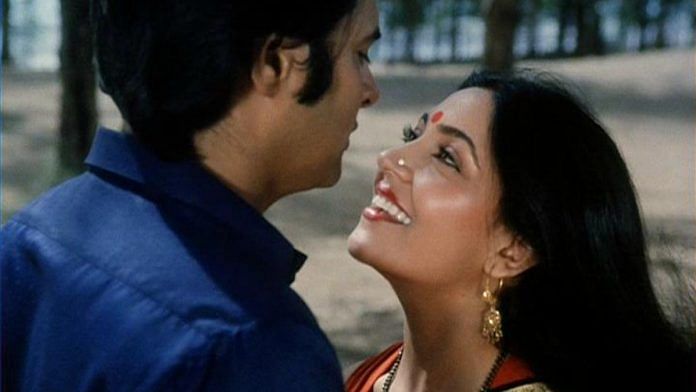Kissi Se Na Kehna—this 1983 film is a lesser-known gem from Hrishikesh Mukherjee’s vast crop of feel-good, family entertainers, like Chupke Chupke, Gol Maal, Anand, Khubsoorat and Naram Garam. However, this Deepti Naval, Farooq Sheikh starrer seems to be making headlines for all the wrong reasons, as a clip from the film, posted on social media, has landed Alt-News co-founder Mohammed Zubair in trouble. The film, however, is not all about that one scene that got Zubair arrested on charges of hurting religious sentiments. Kissi Se Na Kehna, which also has Utpal Dutt, has a lot of family drama and comedy in store for viewers, and steers far from controversy.
Comedy takes centre stage
As the film begins, central characters pop out of the screen, urging audiences to “keep mum.” But what is this secret that the viewers are being asked to keep? Hrishikesh Mukherjee builds up on this curiosity. Utpal Dutt aka Kailashpati Trivedi is a widower, and the father of his only son Ramesh, played by Farooq Shaikh. Ramesh is a talented, hard-working fellow who is promoted from manager to general manager in just eight months. He not only wins the heart of his boss Lalaji, but also manages to woo his boss’ niece, Ramola Sharma (Deepti Naval). Ramola is a qualified doctor and a modern girl in every sense—far from the ideal village belle Ramesh’s father so adamantly wants as daughter-in-law.
Saeed Jaffrey, who plays Ramesh’s uncle, then works as cupid and comes up with an idea. What if Ramola becomes Rama and pretends to be the exact version of what Kailashpati is looking for? The roller coaster ride that follows forms the crux of the story.
This film reminds one of famous play Reedh ki Haddi, by Jagdish Chandra Mathur. Reedh Ki Haddi is about a girl who has to hide her academic credentials because the person who has come to see her for marriage, does not want an educated, English-speaking girl as his wife. The only difference here is, that the play’s protagonist, Uma, calls them out but Ramola chooses to be a part of the plan for the sake of her love.
Kissi Se Na Kehna seems to take inspiration from Mukherjee’s earlier works Chupke Chupke and Gol Maal. In Gol Maal, Utpal Dutt’s character was as rigid as in this film, and does not like a man without a moustache, while in Chupke Chupke, Parimal Tripathi (Dharmendra) is also into the Hindi vs English debate.
Mukherjee is a master at portraying the intricacies of human relationships and highlighting middle-class hopes and dreams—a feat he manages to achieve with Kissi Se Na Kehna, too. It is also hilarious to see Sheikh switch personalities in front of his wife and father—bold and sassy one moment, scared the other. Add to this Rahi Masoom Raza’s witty dialogues and Bappi Lahiri’s peppy compositions, and you have the quintessential family entertainer Mukherjee is known for.
Also read: Sabbir Khan’s Nikamma has fresh cast, ‘new’ Shilpa Shetty but promises migraine for the day
The Indian vs Western argument
The modern versus traditional debate is also portrayed in an interesting way. Kailashpati represents every traditional, conservative Indian who resents change and westernisation.
However, the film also made an important point through Kailashpati, who seems rigid and orthodox, but if looked carefully, is not against education.
In a monologue, Kailashpati makes it clear that it is not the English language that he is opposing, but the fact that those who study the foreign language seem to forget their own culture, language and heritage. Mukherjee’s film represents this conflict of traditional versus modern India, presenting both sides without being loud and preachy. If we look carefully, the Kailashpatis have not gone anywhere. We often find them resenting change and opposing westernisation—declaring that it is a huge ‘threat’ to our ancient culture and civilisation—especially on Twitter.
(Edited by Zoya Bhatti)



